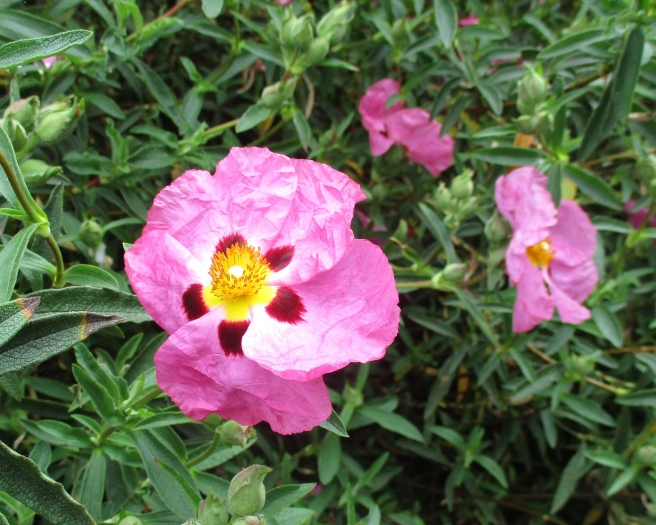Orchid Rockrose
(Cistus ×purpureus)
Orchid Rockrose (Cistus ×purpureus)
/
/

© sprcrkwild
CC BY 4.0
Image By:
© sprcrkwild
Recorded By:
Copyright:
CC BY 4.0
Copyright Notice:
Photo by: © sprcrkwild | License Type: CC BY 4.0 | License URL: http://creativecommons.org/licenses/by/4.0/ | Uploader: sprcrkwild | Publisher: iNaturalist |























Estimated Native Range
Summary
Cistus ×purpureus, commonly known as Orchid Rockrose, is a semi-evergreen subshrub native to the Mediterranean region, where it thrives in scrubland and rocky areas. It typically grows to a height and width of 4-6 feet (1.2-1.8 meters), presenting a bushy and dense habit with slightly wavy, dark green leaves. The Orchid Rockrose is celebrated for its large, showy pink flowers, each adorned with maroon to dark purple blotches at the base, blooming profusely from late spring to early summer. Although individual flowers are short-lived, lasting only a day, the plant continuously produces new blooms over the season, resulting in a long-lasting floral display.
Orchid Rockrose is valued for its drought tolerance and ability to thrive in poor soils, making it an excellent choice for water-wise gardens and Mediterranean landscapes. It is often used in rock gardens, as a border specimen, or in mass plantings for ground cover. This plant prefers full sun and well-drained soil, tolerating a range of soil types, including sandy and loamy soils. While it is generally low-maintenance, it benefits from occasional pruning to maintain its shape and promote denser growth. There are no major disease problems, but it can be susceptible to root rot in poorly drained soils. It is not known for aggressive roots or significant invasiveness.
The Orchid Rockrose is a hybrid, and its exact parentage is unclear, but it is believed to be a cross between Cistus ladanifer and Cistus creticus. It is not typically invasive when grown outside its native range, but gardeners should always monitor and manage plants to prevent unwanted spread.CC BY-SA 4.0
Orchid Rockrose is valued for its drought tolerance and ability to thrive in poor soils, making it an excellent choice for water-wise gardens and Mediterranean landscapes. It is often used in rock gardens, as a border specimen, or in mass plantings for ground cover. This plant prefers full sun and well-drained soil, tolerating a range of soil types, including sandy and loamy soils. While it is generally low-maintenance, it benefits from occasional pruning to maintain its shape and promote denser growth. There are no major disease problems, but it can be susceptible to root rot in poorly drained soils. It is not known for aggressive roots or significant invasiveness.
The Orchid Rockrose is a hybrid, and its exact parentage is unclear, but it is believed to be a cross between Cistus ladanifer and Cistus creticus. It is not typically invasive when grown outside its native range, but gardeners should always monitor and manage plants to prevent unwanted spread.CC BY-SA 4.0
Plant Description
- Plant Type: Shrub
- Height: 4-6 feet
- Width: 4-6 feet
- Growth Rate: Moderate
- Flower Color: Pink
- Flowering Season: Spring, Summer
- Leaf Retention: Evergreen
Growth Requirements
- Sun: Full Sun
- Water: Low
- Drainage: Fast, Medium
Common Uses
Drought Tolerant, Low Maintenance, Rock Garden, Showy Flowers, Street Planting
Natural Habitat
Native to Mediterranean scrubland and rocky areas
Other Names
Common Names: Purple-Flowered Rock Rose
Scientific Names: Cistus ×purpureus , Cistus ×purpureus f. argenteus , Cistus ×purpureus f. holorhodos , Cistus ×purpureus f. stictus , Cistus ×purpureus var. argenteus
GBIF Accepted Name: